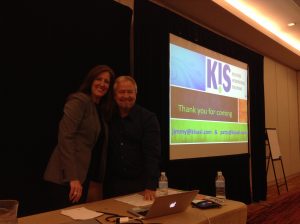Team Me Up? CDI
 Jimmy Beldon and Patty McCutcheon are the owners of Keystone Interpreting Solutions. Standing on the platform, presenting together, they embody a trust-filled, effective and collaborative team. Jimmy is an RID Certified Deaf Interpreter (CDI). Patty is a hearing interpreter. Their agency is based on the concept of Deaf and hearing people working together, each bringing unique qualities that contribute to the strength of the team. Patty Describes their collaborative relationship: “Jimmy and I are a great team! Can you see how we just click?”
Jimmy Beldon and Patty McCutcheon are the owners of Keystone Interpreting Solutions. Standing on the platform, presenting together, they embody a trust-filled, effective and collaborative team. Jimmy is an RID Certified Deaf Interpreter (CDI). Patty is a hearing interpreter. Their agency is based on the concept of Deaf and hearing people working together, each bringing unique qualities that contribute to the strength of the team. Patty Describes their collaborative relationship: “Jimmy and I are a great team! Can you see how we just click?”
Trust – Deaf and Hearing Interpreting Teams
Understanding what teamwork means is vital to any professional relationship. Deaf and hearing teams must approach the work as one unit, both bearing equal responsibility for the message. They have to hold each other accountable. Before two individuals can work as a team in this way, trust must be established. But that can be hard to do.
Trust between colleagues starts forming from the moment introductions are made. Jimmy encourages hearing interpreters to be cognizant of the cultural differences in the ways Deaf and Hearing people greet and “meet” one another. Interpreters often (unintentionally) interact with their CDI team just like they do their hearing teams: following hearing norms that typically lack eye contact, touch, and welcoming body language. This means being self aware and culturally aware is important.
Attitude – Check It
Before ever meeting with your team, “check your attitude!” Patty warns. This can be the biggest stumbling block to building trust. Attitude problems can stem from several places, and from both parties. Why do we have to check our attitudes in the first place?
Let’s face it, hearing interpreters can be defensive. “I know great interpreters who are incredibly skilled, but they have terrible attitudes about working with a CDI,” Patty says. Why? They feel threatened. They feel they have been doing a good job, and are now being judged as inadequate and unable to provide the services they are trained and hired to provide. The root of this feeling? Lack of trust. Other times hearing interpreters are genuinely intimidated or fearful of being judged by a Deaf team.
But wait! Jimmy pauses thoughtfully, “You know, you CDIs have attitude, too…” He points around the room with a smile. Some DIs in the room nod and laugh, freeing the whole room to laugh a little, too. One Deaf participant stands and admits that as a new CDI she had lots of attitude: “I was so tired of years of oppression. I was protecting myself with attitude. I had to really work through that within myself before I could be an effective team.”
All humans carry their life experiences with them, and use those experiences to make sense of the world. The Deaf community has experienced decades of oppression, and it takes time to detox. As hearing interpreters who are learning to understand this, we can come alongside our team and support the process.
Strength – Working as a Team
So, hearing and Deaf interpreters are on the road to establishing trust. Now what? Work together often. Establish a pre-brief as the norm. Discuss common problems that may come up. Have a collaborative – not an individualist – mindset.
Remember that teaming with CDIs is a little different, and hearing interpreters should approach teaming with curiosity. For example, Jimmy doesn’t usually break eye contact with the consumer, but can still read everything his team says. Some hearing interpreters aren’t used to this, so this type of information is important to share before starting an assignment.
Reframe – The Value Deaf Interpreters Bring to the Table
I’ll leave you with some poignant thoughts shared by our interpreting colleagues during the workshop:
Patty McCutcheon: I study and understand Deaf culture, but I don’t live in the Deaf world. CDIs provide so much cultural context that I just don’t have. Why wouldn’t I want to bring that to the table? Using a CDI strengthens the interpreting team and enhances the message.
Hearing Interpreter: I don’t often get to watch CDIs. Here at the RID national conference, I notice that watching a CDI is actually easier on my eyes! I feel like the language I get from them is easier to process. This has helped me see how teaming with a CDI can bring comfortable clarity to the communication.
Deaf Interpreter: I am an intelligent Deaf person with a Master’s degree. Many people think CDIs are for people who “aren’t smart.” That is not true. I appreciate the access that a CDI provides me. A number of years ago I had to go to court for a complicated, personal legal matter. A hearing interpreting team was provided for me. When I read the transcript of the legal proceedings, I was disappointed by how I was portrayed. Court is stressful for everyone involved, and a CDI would have made the process smoother and represented me more accurately.
The Future
I’m so grateful to Patty and Jimmy for sharing such a positive and informative message on teaming with CDIs. I have a whole new appreciation for the work a CDI does, and feel I have new tools to use when working with a Deaf team. Patty shares that, looking back, she remembers many jobs that were unnecessarily difficult: “I wish I could go back in time! I would have requested a CDI.” Have you ever left a job feeling that way? I know I have. In reality, we don’t ever have to have that sinking feeling again. Let’s commit to setting the precedent that a Deaf Interpreter is a valuable member of the interpreting profession.
* Special thanks to Street Team member, Lindsey Kaswoski.








